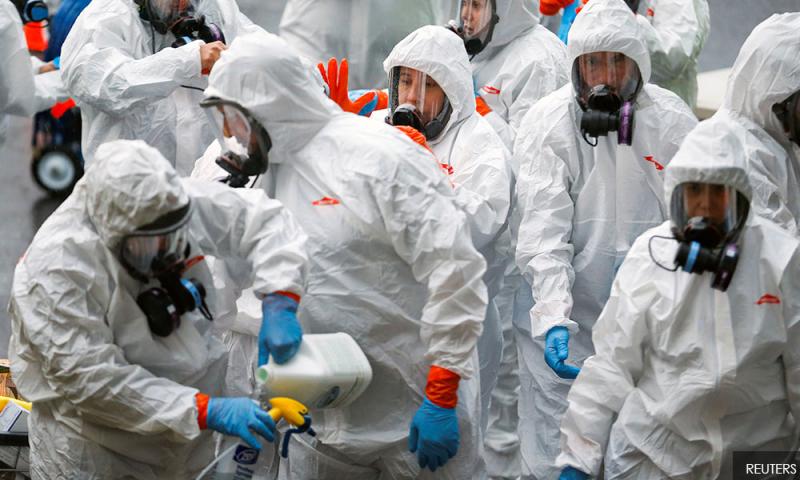Your Covid-19 healthcare questions, answered
Several months into the coronavirus pandemic, information about Covid-19 continues to change rapidly and many questions about the virus remain unanswered.
As part of our weekly #AskReuters Twitter chat series, Reuters invited a group of healthcare experts to discuss what they have learned so far.
Below are edited highlights.
When it comes to Covid-19, what are the biggest lessons we have learned in the past month?
“From a healthcare perspective, it has made our nation take a closer look at our healthcare system – problems with equitable access, and how we can be better prepared.”
— Janis M. Orlowski, MD, chief health care officer at Association of American Medical Colleges
In terms of detection, treatment and prevention, what is working and not working?
“Testing is working, but not yet at the levels that we need in most countries. Contact tracing, isolation of cases and quarantine of contacts can be extremely successful if done well.”
— Aubree Gordon, associate professor of epidemiology at University of Michigan School of Public Health
How and when will social distancing eventually end?
“If we stop our public health interventions too soon, or prematurely start to gather in large groups, there should be no surprise that we see the re-emergence of Covid-19 hot spots, and that these will spread to other regions as people travel.”
— Dr Isaac Bogoch, clinician investigator at Toronto General Hospital Research Institute
Can antibody tests help determine who can safely go back to a “normal” life (work, school, etc.) while the virus remains a threat?
“We need to be cautious about antibody tests. Epidemiologists believe that the proportion of people already infected is low — if true, results of antibody tests may be helpful to individuals but may not help as we look to safely reopen society.”
— National Foundation for Infectious Diseases
Does the presence of antibodies mean an individual is immune to Covid-19?
“We do not know enough about the new coronavirus yet to determine whether survivors are really immune.
“Covid-19 is such a new disease that there is no solid data on the immunity of survivors. But given its similarities to other coronaviruses, such as SARS and MERS, it’s expected to convey at least some immunity.”
— Infectious Diseases Society of America
What are the most promising advances in research, testing, treatment and vaccines for Covid-19?
“From a personal standpoint, the most promising advance has been the real-time collaboration by researchers and clinicians across the globe to tackle this problem in such a short time. The entire community is working together across regional boundaries.”
— Jason Kindrachuk, assistant professor of viral pathogenesis at University of Manitoba, Canada
Will warmer weather in North America mean fewer cases of Covid-19?
“I wouldn’t bank on the weather. I’m worried if anything it will make staying home harder and can increase risk. At least up here in Michigan, it’s hard to resist the siren song of the sun when it starts peeking out.
“I think the problem is that when we take some kind of action, we want to see immediate and tangible results. Not going to the beach this June is sort of like not eating a whole box of Oreos today. It’s hard to defer that kind of reward for distant, uncertain gain.”
— Jon Zelner, infectious disease and social epidemiologist at University of Michigan School of Public Health
When it comes to Covid-19, what worries you most?
“I worry that the politicisation of this pandemic is leading to some really bad policy decisions, such as placing priority on the economy over public health.
“Dismissing the pandemic as ‘like seasonal flu’ and minimising the effect on vulnerable populations could lead to a huge second wave of infection and many deaths.”
— Angela Rasmussen, virologist at the Center for Infection & Immunity at Columbia University
What are you optimistic about right now?
“I am most optimistic about how I see everyday people coming together to help others out. I love how as scientists we have come together across the world to try and develop solutions to combat Covid-19. It gives me some hope during this time.”
— Dr Krutika Kuppalli, vice-chair of the IDSA Global Health Committee
- Reuters
Keep up with the latest information on the outbreak in the country with Malaysiakini's free Covid-19 tracker.
Malaysiakini is providing free access to the most important updates on the coronavirus pandemic. You can find them here.
Help keep independent media alive - subscribe to Malaysiakini.
RM12.50 / month
- Unlimited access to award-winning journalism
- Comment and share your opinions on all our articles
- Gift interesting stories to your friends
- Tax deductable

 Reuters
Reuters